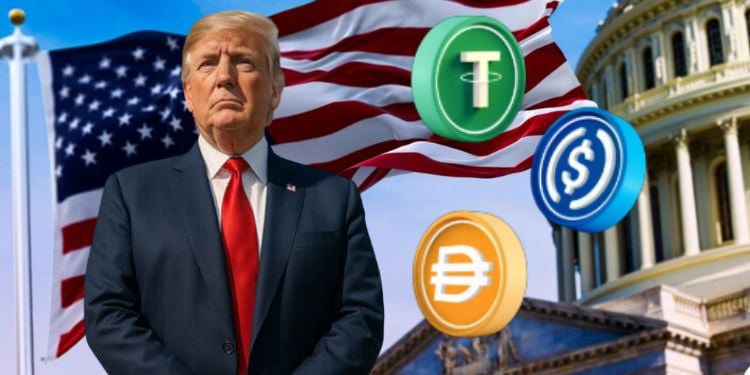- The U.S. House passed three major crypto bills, with the GENIUS Act now heading to Trump’s desk for signature.
- The legislation sets rules for private stablecoin issuance and aims to block a Fed-issued digital currency.
- Big banks and retailers like JPMorgan and Amazon are exploring stablecoin use to cut costs and streamline payments.
In a week full of crypto headlines, the U.S. House of Representatives just made a big move. On Thursday, lawmakers passed three major cryptocurrency bills backed by President Trump, marking a big step in reshaping how the U.S. handles digital assets. The most notable? The GENIUS Act, which sets the groundwork for private companies to issue stablecoins. That one’s already passed both chambers and now heads to Trump’s desk for a signature—which he’s expected to give without hesitation.
It’s all part of Trump’s broader goal to turn the U.S. into the “crypto capital of the world.” His administration’s been leaning into the space hard lately, and this week’s legislative push is just the latest sign. Along with the GENIUS Act, the House also passed the CLARITY Act and the Anti-CBDC Surveillance State Act. The first aims to build out a clearer regulatory framework for crypto in general. The second would block the Fed from launching a central bank digital currency. Those two still need Senate approval, but the momentum’s there.
Stablecoins, Big Banks, and Big Tech in the Mix

The GENIUS Act is already getting attention from some heavy hitters. Big banks like JPMorgan, Citi, and Bank of America all faced questions during earnings calls this week about how they plan to respond. Stablecoins—crypto tokens pegged to a currency like the U.S. dollar—could shift how money moves through the system. For the banks? That’s a big deal. For consumers? It might change how they shop, save, and send money.
Even major retailers are watching this closely. Rumor is Walmart and Amazon are exploring their own stablecoin launches. If they follow through, they could save serious cash by cutting down on credit card transaction fees. That’s not a small thing—those fees run into the billions every year. So yeah, stablecoins aren’t just a finance thing anymore. They’re looking like a business strategy, too.
A Watershed Moment—or Just More Hype?
Ji Hun Kim, CEO of the Crypto Council for Innovation, called this week a “watershed moment” for the crypto industry. He praised the GENIUS Act and said the CLARITY Act would help replace all the gray areas with real guidelines—something builders and investors have been begging for. Whether this changes everything or just sets the stage for more debate, the vibe is definitely shifting. This isn’t niche tech anymore. It’s national policy.
The crypto space has been waiting a long time for lawmakers to actually do something. And while we’re not totally there yet—the Senate still has to sign off on two of the three bills—it’s hard not to feel like something big just happened. For a sector that thrives on hype, this one actually has some weight behind it.
What’s Next: All Eyes on the Senate and Trump
With the GENIUS Act basically ready for Trump’s signature, the real focus now turns to the Senate. Will they greenlight the CLARITY and Anti-CBDC bills? That remains to be seen. But with Trump openly championing crypto-friendly policy, and markets reacting to the momentum, things are definitely in motion.
If these bills go through, we’re looking at a whole new playing field. One where private companies can issue stablecoins with clearer rules. Where the Fed can’t roll out a digital dollar. And where innovation doesn’t have to tiptoe around outdated regulations. Whether you’re a trader, a builder, or just someone who watches this stuff unfold from the sidelines—keep your eyes peeled. The next few weeks could be wild.














